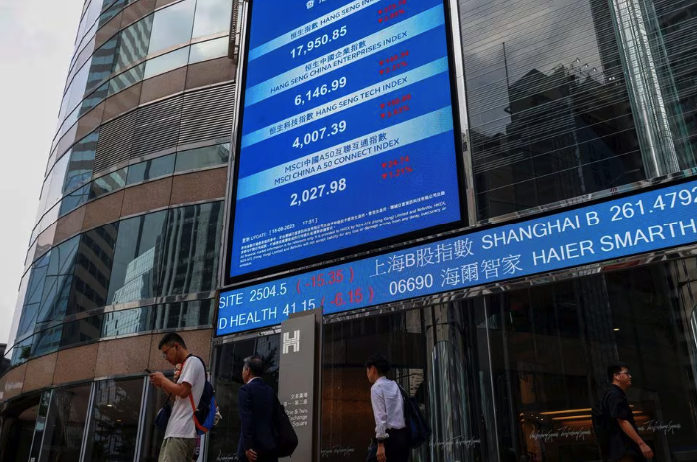
HEDGE FLOW in recent years, the global financial landscape has witnessed significant fluctuations, with particular attention drawn to the movement of hedge funds, especially regarding their activity in emerging markets like China. This article delves into the recent surge in hedge fund interest in Chinese stocks, exploring the underlying factors, market responses, and potential implications for investors.
The Surge in HEDGE FLOW Fund Interest in Chinese Stocks
HEDGE FLOW funds, renowned for their speculative and often contrarian strategies
have shown a remarkable uptick in their engagement with Chinese equities. Despite previous bearish sentiments, hedge funds embarked on a significant buying spree over three consecutive days, marking the most substantial accumulation of Chinese stocks in over five years. This sudden surge in interest coincided with intensified efforts by Beijing to stabilize its economy amidst challenges in the property sector and sluggish growth.
Factors Contributing to the Surge
Several factors have contributed to this sudden influx of hedge fund activity in Chinese stocks. Firstly, Beijing’s proactive measures to restore market confidence, coupled with supportive monetary policies, have instilled optimism among investors. Additionally, the perceived undervaluation of Chinese equities following a prolonged period of bearishness presented an attractive opportunity for hedge funds seeking potential upside.
Market Response to Hedge Fund Activity
The market responded swiftly to the surge in hedge fund interest
with notable gains witnessed in key indices such as Hong Kong’s blue-chip stock index and Shanghai’s broader stock index. This turnaround in sentiment underscores the significant influence of hedge fund positioning on market dynamics
reflecting a shift from predominantly bearish sentiments to bullish inclinations.
Shift in Sentiment and Investment Patterns
The notable shift in sentiment among hedge funds towards Chinese equities signifies a potential turning point in market dynamics. Contrary to previous weeks dominated by bearish bets, hedge funds have increasingly embraced outright long positions, indicative of their confidence in the prospect of Chinese stocks.
Overview of Sentiment Shift
The influx of capital into Chinese equities, coupled with substantial net buying observed in Asian emerging markets, suggests a broader sentiment shift favoring risk assets. This renewed optimism is further corroborated by the significant inflow of funds into Chinese equity funds, reflecting investor appetite for exposure to the region.
Investment Patterns Observed in Hedge Funds
Hedge funds predominantly channeled their investments into U.S.-listed shares of overseas companies, leveraging American Depositary Receipts (ADRs) as a proxy for Chinese equities. Subsequently, they diversified their holdings by acquiring mainland A-shares and Chinese companies listed in Hong Kong, demonstrating a strategic approach to portfolio allocation.
Implications for Chinese Equities
The surge in hedge fund interest carries significant implications for Chinese stock markets, with potential ramifications for investors and market participants alike. The infusion of capital and the shift in sentiment towards Chinese equities could catalyze a sustained rally, bolstering market sentiment and attracting further investments.
Analysis of the Impact on Chinese Stock Markets
The influx of hedge fund investments is poised to inject liquidity into Chinese stock markets, potentially mitigating downside risks and fostering market stability. Moreover, the positive market sentiment stemming from hedge fund activity could stimulate domestic consumption and drive economic growth
thereby benefiting various sectors of the economy.
Predictions for Future Trends
Looking ahead, the prevailing trend of hedge fund engagement in Chinese equities is expected to persist, albeit with fluctuations influenced by macroeconomic factors and geopolitical developments. However, cautious optimism prevails
with market analysts and institutional investors maintaining a constructive outlook on the long-term prospects of Chinese stocks.
Conclusion
In conclusion, the surge in hedge fund interest in Chinese stocks reflects a notable shift in market sentiment and investment patterns, underscoring the resilience and attractiveness of the Chinese equities market. While uncertainties persist
particularly amidst global economic challenges, the prevailing optimism surrounding Chinese stocks bodes well for investors seeking diversified opportunities in emerging markets.
Unique FAQs
-
Why are hedge funds suddenly interested in Chinese stocks?
- Hedge funds have been attracted to Chinese stocks due to perceived undervaluation, supportive government policies
and efforts to restore market confidence amidst economic challenges.
- Hedge funds have been attracted to Chinese stocks due to perceived undervaluation, supportive government policies
-
What impact does hedge fund activity have on Chinese stock markets?
- Hedge fund activity injects liquidity, fosters market stability, and influences market sentiment, potentially driving positive momentum in Chinese equities.
-
How do hedge funds invest in Chinese stocks?
- Hedge funds employ various strategies, including outright long positions
acquisition of ADRs, and investment in mainland A-shares and Chinese companies listed in Hong Kong.
- Hedge funds employ various strategies, including outright long positions
-
Are there risks associated with investing in Chinese equities amidst hedge fund activity?
- While hedge fund activity can contribute to market volatility, it also presents opportunities for investors
with careful consideration of associated risks and market dynamics.
- While hedge fund activity can contribute to market volatility, it also presents opportunities for investors
-
What are the long-term prospects for Chinese stocks amid hedge fund interest?
- Despite short-term fluctuations, the prevailing sentiment remains constructive
with analysts optimistic about the growth potential and resilience of Chinese equities in the long run.
- Despite short-term fluctuations, the prevailing sentiment remains constructive
